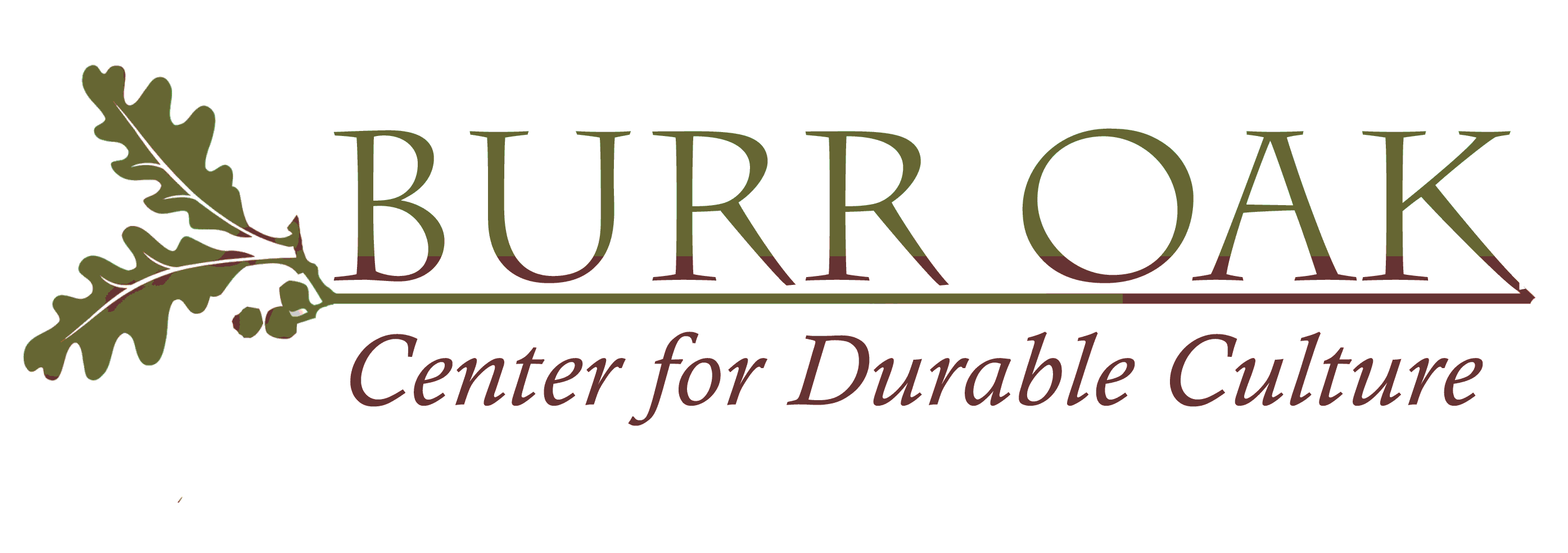 |
course materials for organic farming, gardening and marketing
(contact Michael Luick-Thrams for more information)
Burr Oak School
TRACES has offered educational opportunities—lectures, exhibits, conferences, concerts, film series—to tens of thousands of people, for years. It continues to educate, even as the organization’s main focus shifts to the ecological, economic and social crises facing the world. This we do, with varying target audiences, in differing ways.
At the Burr Oak School learners acquire the knowledge and skills they hold most important and meaningful to their lives. More than in most educational settings, they play the central role in determining the quantity and quality of what they learn. Interns especially—both resident and off-site—work with staff to design courses of study that reflect their interests and needs. Short-term guests and visitors, too, can find answers to some of their keenest inquiries, and leave richer for it.
At Burr Oak School, learning takes place in an integrated environment. Here, in the heart of Iowa’s Loess Hills, humans explore nature and how to live better with it. At the same time, they address social concerns while training to become better, more engaged and responsible citizens of an increasingly interdependent—and endangered—planet.
Burr Oak School’s primary educational opportunities include:
resident internships
The most extensive and intensive instructional contact the Burr Oak School offers is with resident interns, adults of any age who live and work on-site in Big Blue with resident staff. They may be adults of any age, for stays of at least one quarter, or up to one year. Staff offer a comprehensive curriculum, allowing interns to focus as a "major"* on at least one of ten main study areas: 1) organic gardening/farming, 2) small livestock, 3) carpentry or other practical arts, 4) alternative energy generation and usage, 5) independent or cooperative marketing, and operational financing, 6) health and wellness, 7) prairie/woodland restoration and management, 8) green "transition" methods, 9) food arts, and 10) [rural] community [re-]building. [*They may declare an additional major or two minors in any of the remaining nine main study areas.] Constituting an eleventh study area, in conjunction with Burr Oak staff, all resident interns must create an independent-study project, parallel to their other studies, which deepens their understanding of the five other areas they have chosen to learn intensively. Resident workers literally will be “working in the field”: besides carrying out the gardening at the Burr Oak Center in Turin, they will rotate among partner-project sites in Monona County/Iowa and near Prague/NE (an hour west of Omaha), where besides general organic gardening and farming, they will focus on starting new asparagus beds, rasp- and aronia berry patches, etc. Tim Houfek has the ability to raise a small number of lambs or calves, as well. At Burr Oak, lines between “teacher” and “student” blurr: all learn together, even as all residents live and work together. Tasks related to daily life (cooking, washing, cleaning, etc.) are divided evenly by all adult and teenage residents. As with others, core-community members expect resident interns to be well-aware of and fully respect the Center’s agreed-upon norms and expectations, even if understanding them does not denote full agreement. Costs and funding are determined on individual bases, influenced by each learner’s needs and abilities. Some stipends and work-study may be available. Few are turned away due to limited resources!
non-resident internships
guest stays
Burr Oak’s guests come for a specific reason, and stay at least one night, up to three weeks. (After three days, the BOC requests a donation to cover food and other stay-related costs.) Either upon their own initiative or per invitation, they come to learn, to teach, to work, to play, or simply “be”. They enrich what we do, and we, in turn, enrich their lives. Together, we make the world a better place.
public programming
Want to learn how to cook a better kale casserole, or do yoga? Wonder how red cedar trees destroy Loess hillscapes, or how to build a more effective compost pile? As part of its larger mission, the Burr Oak Center offers the public diverse programming: guest speakers, films, music, activities, retreats... We welcome all who come to us with open minds and open hearts. To learn about past or up-coming programs, see PROGRAMS or contact the staff at admin@TRACES.org.
web site as resource
TRACES and the Burr Oak Center staff continually revise and update this web site, only one of numerous ways to gain from the innovative, unique work undertaken by the Burr Oak Center for Durable Culture.